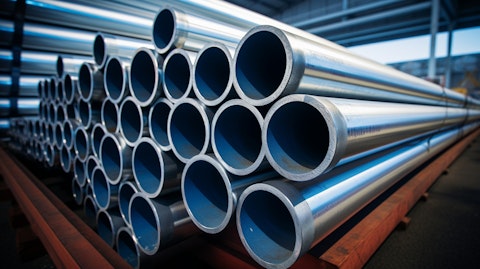Ascent Industries Co. (NASDAQ:ACNT) Q2 2024 Earnings Call Transcript August 6, 2024
Ascent Industries Co. beats earnings expectations. Reported EPS is $-0.02, expectations were $-0.22.
Operator: Good afternoon, everyone, and thank you for participating in today’s conference call to discuss Ascent’s Financial Results for the Second Quarter ending June 30, 2024. Joining us today are Ascent’s Executive Chairman of the Board, Ben Rosenzweig, CEO, Brian Kitchen, CFO, Brian Kavaloskis, and the company’s Outside Investor Relations Advisor, Cody Cree. Following their remarks, we’ll open the call for your questions. Before we go further, I would like to turn the call over to Cody Cree as he reads the company’s Safe Harbor statements with the meaning of the Private Securities Litigation Reform Act of 1995 that provides important cautions regarding forward-looking statements. Cody, please go ahead.
Cody Cree: Thanks, Cherie. Before we continue, I’d like to remind all participants that the discussion today may contain certain forward-looking statements pursuant to the Safe Harbor provisions of the Federal Securities Laws. These statements are based on information currently available to us and are subject to various risks and uncertainties that could cause actual results to differ materially. Ascent advises all those listening to this call to review the latest 10Q and 10K posted on its website for a summary of these risks and uncertainties. Ascent does not undertake the responsibility to update any forward-looking statements. Further, the discussion today may include non-GAAP measures. In accordance with Regulation G, the company has reconciled these amounts back to the closest GAAP-based measurement.
Reconciliations can be found in the earnings press release issued earlier today and posted on the Investor section of the company’s website at ascentco.com. Please note that this call is available for replay via a webcast link that is also posted on the Investor section of the company’s website. With that, I’d like to turn the call over to Ascent’s Executive Chairman of the Board, Ben Rosenzweig. Ben, over to you.
Ben Rosenzweig: Thank you, Cody, and good afternoon, everyone. I’m pleased that we reported improved financial results for the second quarter as our stabilization efforts are beginning to bear fruit. Though the broader demand environment remains soft, we did see some volume pickup across both segments due to churning through some slow-moving inventory as we continue shifting towards more profitable product lines. We expect demand will slowly improve through the remainder of the year and see more substantial growth opportunities to occur in 2025 and beyond. In the meantime, we’ve continued to diligently focus on our near-term initiatives to cut costs, drive operational efficiencies, and optimize our product mix in both segments.
There’s still more to be done on all these fronts, but we’re pleased to see our initial efforts working. We expect financial improvements in the back half of the year to come from these internal self-help initiatives rather than anticipating any meaningful uptick in demand on the sales side. Brian will provide all the specific details on each segment, but I’m pleased that we’re on the right track towards executing our long-term vision for both of these businesses. We continue to take steps towards maximizing the value of our Tubular segment as we execute basic business fixes while keeping our main focus on driving long-term profitable growth initiatives for the specialty chemical segment. We remain confident in our belief that this segment, run by the team that Bryan and Ryan are building, can deliver more profitable and predictable revenue streams, resulting in better value for shareholders over the long term.
Turning to our capital allocation priorities, we remain comfortable with where our current liquidity position is today. We have ample availability within our revolving credit facility that allows us to be flexible should an opportunity arise to deploy capital to high conviction in accretive areas, but we’re still focused in this moment on optimizing the current operations across the company. We continue to repurchase shares in the open market and remain committed to exploring all avenues to do so as long as our stock trades below our expectation of the company’s intrinsic value. It’s been our near-term mission to restore credibility with the market and, overall, we’re making progress executing against stated goals and I remain highly confident in our strategic direction.
In the near term, we expect to step up our investor relations efforts as we have a story that I believe resonates well with the small cap investment community and it’s incumbent on us to bring that message to a wider audience. I’m pleased that we’ve returned assent to positive adjusted EBITDA, strengthened our balance sheet, and positioned the company to better capitalize on future growth opportunities. I look forward to continued momentum in the quarters and years to come. Now, I’d like to pass the call over to Bryan to provide details on our operations across both segments. I’ll be available later on to answer any questions. Bryan, over to you.
Bryan Kitchen: Thanks, Ben, and thank you all for joining us this afternoon. During our Q1 2020 for earnings call, I shared that momentum was building across the enterprise and that our actions were positioning us nicely for a recovery in the back half of the year. Momentum continued to build in Q2 and I’m pleased to report that despite both market-driven and cleanup-related headwinds, we delivered the best quarter of consolidated adjusted EBITDA since the fourth quarter of 2022 and we did so without tapping into our revolving credit facility. The markets have not done us any favors as demand across the segments remains soft. Material volume gains in Q2 were largely attributed to our efforts to monetize slow-moving inventory, which more than offset our purposeful deselection of unprofitable business.
Our road to improved profitability in Q2 was underpinned by aggressive self-help and was accelerated by the recapitalization of talent across the enterprise. To be more specific, our team delivered a 28% or nearly $4 million reduction in material costs and a 30% or nearly $3 million reduction in labor and overhead as compared to the same quarter prior year. Our aggressive actions positioned us to overcome the impact of ongoing market headwinds, unfavorable mix, and the critical re-investments made in both talent and capabilities. We have a lot of work to do, but our strategy is working and our employees are highly aligned with our long-term vision. We are on the right track to creating durable value for our shareholders. With that, let’s dive into our segment-specific commentary starting with Tubular Products.

Demand across our end markets remains soft. We attribute much of this to higher cost of financing across credit markets that has caused many capital projects to be put on hold. We believe that the underlying softness in demand was further compounded by tight management of working capital across the value chain. We did see strong quarter-on-quarter volume growth of 18%. However, this was offset by unfavorable pricing primarily driven by fulfilling low-priced order backlog and depressed nickel pricing. Despite this, we’ve been hard at work on optimizing all aspects of our cost structure, and we were able to improve our gross profit for the segment by 311% as compared to the prior quarter prior year, and deliver the highest quarterly adjusted EBITDA result for the segment since the fourth quarter of 2022.
As I mentioned in our last call, our focus has not been isolated to continuing operations, but the entire segment, inclusive of Munhall. I’m pleased to share that subsequent to the end of the quarter, we have entered into a definitive agreement to monetize certain assets associated with Munhall, generating $2.8 million of cash proceeds, which equates to $1.5 million or a 55% gain on book value. We are leaving no stone unturned. It all matters. Our overarching goal for the segment is to maximize the value of our current asset base by standardizing, simplifying, and optimizing all that we do. While we are not yet achieving our fullest potential within the segment, we are on the right path. Now let’s shift to our Specialty Chemicals segment. As we’ve anticipated for this year, market demand remained generally soft in the second quarter.
Material year-over-year volume gains of 20% in Q2 were largely attributed to our efforts to monetize slow-moving inventory, while new business wins gained traction, and move towards full run rate impact. We remain hyper-focused on accelerating the sales of our existing product line while thoughtfully exploring new product development opportunities at the request of our customers. Since our last earnings call, our team has been busy sharpening our marketing tactics and evaluating product development opportunities that are centered around solving our customers’ problems. We remain disciplined in our approach, evaluating strategic fit before resources are allocated. Demand on our R&D team increased significantly in Q2, resulting in a record number of new formulations being developed for customer qualification.
While we do hope to see more green shoots in the second half of the year, we are taking full advantage of this time to stabilize, optimize, and establish a strong foundation for growth as we actively work towards shifting more of our capacity to branded product sales. This transition is of critical importance given the improved ratability, predictability, and profitability that solutions-based branded product sales provide. Core to this shift is our ability to solve our customers’ most difficult problems, innovating at the speed of their needs. Momentum continues to build in this space, and we are encouraged by the reception we are receiving from a growing number of blue chip customers. Like the Tubular segment, our path to enhance profitability in Q2 for Chemicals was driven by self-improvement initiatives, delivering sequential month-over-month improvements in material cost, labor, and overhead.
Our team delivered a 28% or $4 million reduction in material cost and a 28% or nearly $3 million reduction in labor and overhead as compared to the same quarter prior year. These gains helped us overcome the impact of ongoing market headwinds and unfavorable mix. As a result, we improved our gross profit in the segment by 466% compared with the prior year quarter. All of these efforts combined culminated into the highest quarterly adjusted EBITDA figure for the segment since the first quarter of 2023. Momentum is building in our Specialty Chemical segment, and we are positioning the business for profitable, organic, and inorganic growth. Our team has accomplished a great deal in a short period of time, but more importantly, we’re doing it the right way.
We are laying a solid foundation for durable earnings growth by standardizing, simplifying, and optimizing all that we do. We are just getting started, but I am pleased with the progress that our team is making. I remain incredibly optimistic about the future of Ascent. And now, I’d like to turn it over to our CFO, Ryan Kavalauskas, to walk us through our second quarter financial results in more detail. Ryan, the floor is yours.
Ryan Kavalauskas: Thank you, Bryan, and good afternoon, everyone. Jumping right into our second quarter financial results, net sales from continuing operations were $50.2 million compared to $50.4 million in the prior year period. The slight decline was primarily attributable to a decrease in pricing across both segments. This was offset by an uptick in year-over-year volume as we churned through lower-priced, slow-moving inventory across both segments. Gross profit from continuing operations increased to $5.9 million compared to negative $0.8 million in the second quarter of 2023, while gross margin increased significantly to 11.7% compared to negative 1.5% in the prior year period. The increase was primarily attributable to continued strategic sourcing initiatives, leading to cost improvements across both segments.
Net loss from continuing operations in the second quarter improved to $0.2 million, or $0.02 diluted loss per share, compared to a net loss from continuing operations of $6.1 million, or $0.60 diluted loss per share for the second quarter of 2023. The improvement was primarily attributable to the aforementioned increase in gross profit and a year-over-year decrease in interest expense due to having much lower outstanding debt. Adjusted EBITDA in the second quarter increased significantly to $2.1 million compared to negative $4.8 million in the same period last year, while adjusted EBITDA margin improved to 4.2% compared to negative 9.4% in the same period last year. The improvement was primarily a result of the aforementioned cost optimization and profitability improvement initiatives we’ve implemented.
Lastly, looking at our liquidity position as of June 30, 2024, we continue to be diligent with our capital, ending our third consecutive quarter with no outstanding debt under our revolving credit facility, which provides us access to $62.7 million in availability to drive organic and inorganic growth in the near future. During the second quarter of 2024, we repurchased a total of 15,233 shares for approximately $156,000 through our share repurchase program. With that, I’ll now turn it back over to the operator for Q&A.
Q&A Session
Follow Ascent Industries Co. (NASDAQ:ACNT)
Follow Ascent Industries Co. (NASDAQ:ACNT)
Receive real-time insider trading and news alerts
Operator: Thank you, sir. [Operator Instructions]. And our first question will come from the line of David Siegfried, a private investor. Your line is open, sir.
Unidentified Analyst: Hey, congratulations on the momentum you achieved in both businesses. That’s remarkable.
Bryan Kitchen: Thank you.
Unidentified Analyst: Just a question. So, with the labor and material costs that have been taken out of businesses, is it safe to assume that there will be margin improvement sequentially going forward?
Bryan Kitchen: Yes. David, hey, it’s Bryan. So, yeah, absolutely. We’re going to see that margin improvement carry through. We’re not done yet, right? We’re continuing to evaluate our product portfolio, our product mix, and we continue to look for ways to further optimize costs.
Unidentified Analyst: Got it. How’s the cadence of the branded product sales and chemicals? How has that been going lately?
Bryan Kitchen: Yeah, good. I mean, I think we reported in our last earnings call that we started to build some pretty meaningful traction. We’re getting closer towards run rate volumes on those initial two sponsoring opportunities that we had. And I would say, again based on the activity that we had in the second quarter from an R&D perspective, we’re heading in the right direction David. In terms of the rest of the portfolio that we have in Tennessee, there’s more work to be done, but we’ve got the right people and we’re hyper-focused.
Unidentified Analyst: So, those wins that you had in the first quarter, the $10 million in new wins, and you have some activity in the second quarter, is that just increased demand or is that just a more effective sales team?
Bryan Kitchen: No, those were net new selling opportunities that we didn’t have in the selling pipeline prior to Q2. So, those were net new and they continue to build month on month, getting to that full run rate volume revenue and EBITDA inside of Q3. So, we’re pleased with the progress, pleased with the traction. There’s a lot more to do and it’s largely driven by hyper-focus and just an incredible team that we’re building.
Unidentified Analyst: Good. Good to hear. So, subsequent to the quarter end, there was the $2.8 million asset sale for Munhall. So, if you add that to the $3.6 million in cash as of June 30, I don’t know what the cash balance would be, but let’s just say it’s north of $5 million. Is that just something you’re just going to let the cash build until it’s determined how to use it?
Ryan Kavalauskas: Yeah, at this point, I mean, I’ll let Ben talk a little more broadly about some of the decisions for capital allocation, but at the business level, we’re strategically looking at re-investments. If there’s accretive margin building capital investments we can make, we’ll look at those. None have come to our attention right away. Inorganic growth is, again, in the near future than we had probably thought. So, looking at things like that. So, at this point, there’s no specific allocation for the capital. We are going to let it build. We’re focused on costs and it’s good to see the cash building the way it is.
Ben Rosenzweig: Yeah, exactly what Ryan said, David. I mean, I think we feel very good about our liquidity position right now. And just because there’s a little bit of excess cash on the balance sheet doesn’t mean we’re going to change the mentality in terms of making sure that everything meets our thresholds. But it is good to have the ability to be building cash at this moment, knowing that we’re creating some enterprise value.
Unidentified Analyst: Absolutely. I don’t think five years that I’ve owned a stock, I don’t think we’ve ever had cash on the balance sheet. So, more than a million dollars. So, that’s good. So then, Bryan and Ryan, you’ve been with the management team for six months or so. Would you say that potential here is more than perhaps what you maybe even perceived six months ago?
Bryan Kitchen: Yeah, I mean, this is Bryan and Ryan, I’ll let you jump in as well. I mean, I’m incredibly bullish about the prospects of our company. I think we’ve got some incredible foundational capabilities. They were just really beginning to unlock what they’re capable of. There’s a lot more to do that we can do inside of our existing asset base.
Ryan Kavalauskas: Yup, couldn’t agree more. I think there’s a ton of efficiency we can pull out of this business. We can continue to drive margin through self-help. So, yeah, I think there’s a tremendous amount of focus commercially. We’ve got to get a lot of things fixed there. But even within the business, how we operate, how we can extract margin more efficiently, there’s more there than we had anticipated. So still take some time to pull it all out and kind of determine what are the bigger levers. But yeah, still remain extremely optimistic about where we’re at, more so than when we started.
Unidentified Analyst: Cool. All right, good. Well, thank you, and thank you for the input, and keep up the good work.
Bryan Kitchen: Thanks, David.
Ryan Kavalauskas: Thanks, David.
Operator: Thank you. At this time, this concludes our question and answer session. I would now like to turn the call back over to Mr. Kitchen for closing remarks.
Bryan Kitchen: Great. Thank you, Cherie. We’d like to thank everyone for listening to today’s call, and we look forward to speaking with you again when we report our third quarter 2024 results. Thanks, and have a great afternoon.
Operator: This concludes today’s program. Thank you all for participating. You may now disconnect.
Follow Ascent Industries Co. (NASDAQ:ACNT)
Follow Ascent Industries Co. (NASDAQ:ACNT)
Receive real-time insider trading and news alerts





